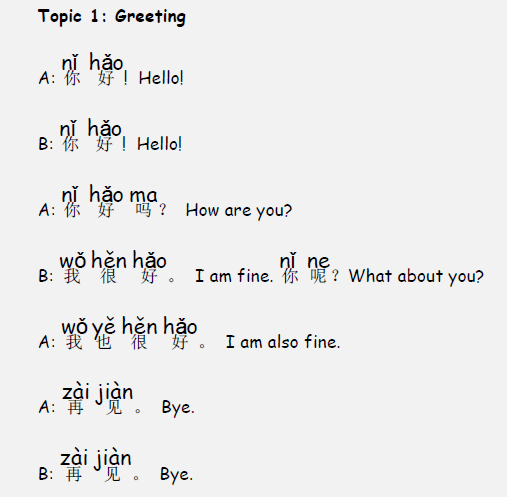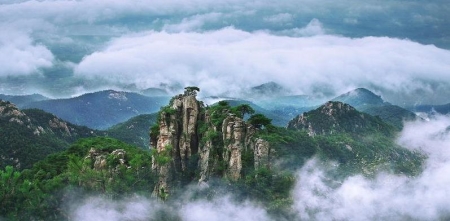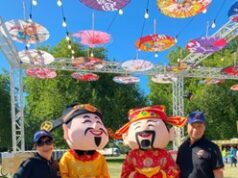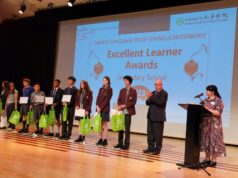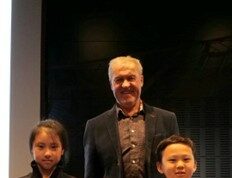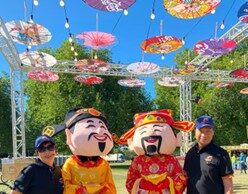view as PDF
IMPORTANT
We will not have a November meeting. This has been replaced by the annual prize giving ceremony at the CPIT on 3 December (details below)
Each year our branch presents prizes and certificates to the best students of Chinese in primary, intermediate and high schools, the Polytechnic, community schools and the university. This is a joyous event, with students, parents, teachers, and others joining together to honour the students. It is our way of encouraging the study of Chinese language in Christchurch, so come and enjoy an exhilarating evening and support our efforts. And a bonus this year: learn about NZCFS work in China!
Certificates and prizes will be presented by
Madam Tan Xiutian – Consul General in Christchurch
Guest Speakers:
Dave Bromwich – NZCFS Vice-President
Dave will talk about NZCFS projects in China and the importance of Chinese language
Lauren Barry
Christchurch Sister City Ambassador – Gansu 2006 Delegation
Cultural performances
Branch News
Welcome to our new members:
- Bernard and Jane Duncan
Facebook (It had to happen!)
The society now has a page on facebook; the progress of technology is remorseless! Have a look at:
http://www.facebook.com/NZChinaSociety
Chinese for Beginners – for Free!!
As some of you will know, branch member Anna Lu is a teacher at Hagley Community College. Here’s a great chance to learn some simple Chinese phrases, and it’ll cost you nothing! Have a look at http://www.hagley.school.nz/programmes/after-three-til-late-evening-programmes/languages/chinese-for-beginners for details.
This is a wonderful opportunity; please pass this information on to anyone you think could be interested.
An Interesting Talk
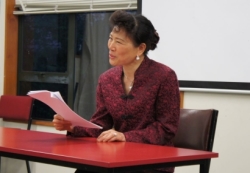 Our October meeting speaker was Consul-General Mme Tan Xiutian, and what a great talk it was! Mme Tan has had an interesting career. She was born and educated in Guangdong Province, and joined the Ministry of Foreign Affairs in Beijing. From there she started her diplomatic career in Australia, and then the UK, Hong Kong SAR and with a one year course in the USA. In 2006, she was designated as Consul-General in Edinburgh covering Scotland and Northern Ireland. One of the highlights for her was the signing in January 2011 of the agreement to bring two giant pandas to Edinburgh Zoo, just before her departure for Christchurch. Many obstacles had to be overcome, and to recognise her efforts they named the female panda Tiantian, a nickname based on hers. A lovely story.
Our October meeting speaker was Consul-General Mme Tan Xiutian, and what a great talk it was! Mme Tan has had an interesting career. She was born and educated in Guangdong Province, and joined the Ministry of Foreign Affairs in Beijing. From there she started her diplomatic career in Australia, and then the UK, Hong Kong SAR and with a one year course in the USA. In 2006, she was designated as Consul-General in Edinburgh covering Scotland and Northern Ireland. One of the highlights for her was the signing in January 2011 of the agreement to bring two giant pandas to Edinburgh Zoo, just before her departure for Christchurch. Many obstacles had to be overcome, and to recognise her efforts they named the female panda Tiantian, a nickname based on hers. A lovely story.
Other highlights for her was Scotch whisky being granted geographical indication of origin status in China, which will give consumers greater certainty that the product they buy is genuine, and the granting of access to the Chinese market of Scottish salmon.
She then spoke on China-New Zealand relations, from when the Chinese gold miners arrived in 1866 through to the present day. As we know, those miners suffered a lot of discrimination. It is to her credit that then Prime Minister Helen Clark apologized in 2002 for the Poll Tax imposed on Chinese immigrants. Mme Tan then touched on the stagnation of the China and New Zealand relationship from
1949 to 1972. With the December 1972 establishment of diplomatic relations, the relationship has developed rapidly in all fields. In 1972, the trade volume between China and New Zealand was only 1.7 million dollars. This figure jumped to 13.3 billion dollars in 2011. With the signing of FTA in 2008, China has now become New Zealand’s second largest trading partner and NShe stressed that Rewi Alley’s spirit is our common resource and more attention should be focused on the education and training of younger generation as successors of China-New Zealand friendship. Young people are the future of our cause.ew Zealand’s exports to China achieved a year-on-year increase to 22% last year. One of the startling statistics she gave was a single day’s export volume to China now is ten times what it was for the whole of 1972! China has become New Zealand’s biggest source of international students; one in four international students is from China and we received over 150,000 Chinese visitors in 2011.
Mme Tan stressed that mutual respect is the prerequisite and foundation for a strong relationship. China’s history, culture, traditions, development stages, population and geographical features etc are all very different from New Zealand’s. This has led China to choose different political systems and follow different paths of development. China has learned from history that the present system fits it better, at least at the present stage of its development.
In October 2010, our two governments signed an agreement to establish a Chinese Consulate-General in Christchurch. The 22 February 2011 earthquake accelerated the pace. China promptly dispatched a rescue team and an advanced team of the Consulate General to Christchurch to liaise with the local government on assistance to the Chinese community and the families of Chinese victims in the disaster and at the same time to prepare for the official opening of the mission, which was opened on 2 December 2011. With great significance it was Rewi Alley’s birthday.
Mme said though it has the world’s second largest economy, China is still a developing country. It has to feed close to 20% of the world population with 7.9% of the world farmland and 6.5% of the world’s fresh water. It has both wealthy and under-developed places. Every year, China has more than 6 million graduates from universities and colleges, a big challenge to both the central and local governments. Other major challenges are environment protection, corruption, health, education, and pensions. Each of them is an enormous number. In Premier Wen Jiabao’s words, a very small problem multiplied by 1.3 billion will become great; a very large of total economic output divided by 1.3 billion will become very small. So, for a long period, development is the only way to China, and the key to resolve all problems. To achieve this, it needs a peaceful and stable international environment.
China is now faced with an arduous task; the modernization of one fifth of the world’s population, and it will be a long process. Unlike New Zealand, China has suffered lots of wars, invaded by many foreign powers. The Chinese people understand very well the brutality of war, and the value of peace. China can never develop without peace and stability. China respects different cultures and welcomes all friendly suggestions and well-intentioned criticism. It sincerely hopes that the international community will appreciate China’s needs and efforts to solve, step by step, the many problems is has in the course of development, and the aspiration of the Chinese people to shake off poverty and live a better and more prosperous life as the Kiwis now enjoy.
Gansu Rainwater Harvesting Expert to visit in December
In December, Professor Zhu Qiang, former Director of the Gansu Research Institute for Water Conservancy (GRIWAC) will be visiting Christchurch with his wife for one week (from Dec. 4th to 12th). The purpose of the visit is to share his long experience in sustainable water resource management. Specifically, how GRIWAC’s research and extension work have assisted in dealing with severe water shortages in Gansu Province through using a variety of rainwater harvesting and low rate irrigation methods and techniques. These approaches have not only provided domestic water supplies to millions of poor rural families, but also helped to feed and provide them with livelihoods using simple but very clever field and greenhouse based micro-irrigation systems.
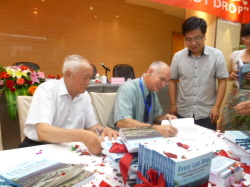 While here Professor Zhu will be giving a seminar at Lincoln University. He will also participate in the New Zealand launch of his recent book Every Last Drop: Rainwater Harvesting and Sustainable Technologies in Rural China which he co-authored with Li Yuanhong and Christchurch based rainwater harvesting specialist and NZCFS member John Gould. The attached photo was taken at the book’s China launch in Lanzhou in August.
While here Professor Zhu will be giving a seminar at Lincoln University. He will also participate in the New Zealand launch of his recent book Every Last Drop: Rainwater Harvesting and Sustainable Technologies in Rural China which he co-authored with Li Yuanhong and Christchurch based rainwater harvesting specialist and NZCFS member John Gould. The attached photo was taken at the book’s China launch in Lanzhou in August.
The visit highlights one practical area of enduring cooperation between Christchurch and Gansu in the increasingly important field of water resource management. It also serves to illustrate some of the concrete and very tangible benefits, beyond the purely economic, which can stem from our Sister City Links with China.
Any NZCFS member who would like to come to the book launch and hear Professor Zhu speak about the book is very welcome to attend.
The event will take place from 12 noon, Friday December 7th in the Function Room, 1st Floor, Christchurch City Council, Hereford St.
If you are intending to come please contact John Gould [email protected] 337 1450.
China-NZ joint Pacific aid project targets water in Cook Islands
RAROTONGA, Cook Islands, Aug. 30 (Xinhua) — China, New Zealand and the Cook Islands announced a new partnership that will deliver an improved water mains system to the people of Rarotonga, the Cook Islands’ main island.
It is the first time China and New Zealand have worked together on a major development initiative in the Pacific.
“This major infrastructure project will improve water quality and address health and sanitation issues in Rarotonga,” New Zealand Prime Minister John Key said.
“Ensuring communities and businesses have access to clean drinking water is critical and will improve livelihoods and promote economic growth,” Key said in a statement.
“It will mean a better quality of life for the people of the Cook Islands and provide an improved tourist experience for visitors.”
The total cost of the new project, which will see reticulated water mains laid across Rarotonga, is approximately 60 million NZ dollars (48.01 million U.S. dollars).
New Zealand would provide 15 million NZ dollars to assist the Cook Islands government, while China would give about 32 million NZ dollars by way of a loan.
The project was part of an on-going commitment by the Cook Islands government to improve its water and sanitation infrastructure and built on the work New Zealand had already carried out to improve the water quality of the Muri lagoon, on the east of the island, said Key.
New Zealand would provide on-going support for both water and sanitation and had earmarked a further 10 million NZ dollars for related initiatives in the Cook Islands.
You Just Have to be Bilingual (Jian Chen)
According to the magazine New Scientist (May 5, 2012), being bilingual is good for your brain. It improves your ability to plan, your memory, how well you can concentrate and multi-task, and how mentally flexible you are.
Tests have shown bi-linguals outperform mono-linguals in both verbal and non-verbal tests. It opens the window for learning language, including your main language. In fact it is a great help in ALL your studies, including maths.
Bi-lingual children at one year old still retain their ability to “take on” unfamiliar languages but mono-linguals have lost that ability.
It can help you with adult tasks, e.g. driving, and in showing empathy towards others. When you get old it can sharpen your mind and delay possible dementia or Alzheimer’s disease.
It doesn’t matter whether you are brought up in a bi-lingual household or whether you learn another language later. It’s like having two different minds rather than just one. How cool is that!
Chinese Corner
Topic 1: Greeting
 I Love My Hometown
I Love My Hometown
30 October 2012
Notes:
1. Mt Yi-Meng region is a collective human-geographical term for Mt Yi and Mt Meng, lying in the south-east of Shandong province with an area of 1190 km². Many famous people in Chinese history like great strategist in the era of the Three Kingdoms Zhu Geliang(诸葛亮,181-234); Confucius teacher Tan Zi (郯子); master calligrapher Wang Xizhi (王羲之,303-361); Prime Ministers in ancient times Kuang Heng (匡衡, East Han Dynasty) and Wang Dao (王导, 276-339); great military commanders Meng Tian(蒙恬, ?-210BC) and Yang Hu (羊祜, 221-278); great mathematicians and astronomers Liu Hong (刘洪, 130-196) and He Chengtian(何承天,370-447)were all born there. In recent history, late President Liu Shaoqi, famous government officials and military commanders such as Chen Yi(陈毅), Luo Ronghuan(罗荣桓), Xu Xiangqian(徐向前)and Su Yu (粟裕) and many others used to work or conducted major military operations there. With so many historical places and tourist attractions it was designated as national park in 1994 and became provincial tourist resort in 1995.
2. Mt Yi-Meng region used to be one of the most under-developed regions in China. Known as one of the three major revolutionary bases during the War against Japanese Aggression and the War for Liberation, with a population of 4.2 million, 200 000 people joined the Communist military forces and over 1 million worked as volunteers to support the frontline. Over 100 000 died for national liberty and freedom. Marshal Chen Yi once recalled with deep affection: “It was the wooden handcarts (the only major means of transport in the region at the time) of Mt Yi-Meng region that carried the Huaihai Campaign (the last major military action to clear off the corrupt and notorious Nationalist government’s military forces from the north of the Yangtze River) to success.” He also said: “I will never forget the people of Mt Yi-Meng region. It was them who supported the revolution with their precious millet (the best staple crop the people could produce and lived on at the time). It was them who, using wooden handcarts, drove the revolution across the Yangtze River.”
3. Before the 1990s, electrical appliances such as radio, TV, washing machine were scarce therefore very precious in China’s countryside, especially in Mt Yi-Meng region. They were symbols of social status and used as dowry when people got married.
4. To revitalize economy commune system was abolished when reform and opening up policy was introduced in the late 1970s and people in the countryside farmed on their own land on family basis. To save manpower and enhance productivity, many specialized co-operative enterprises have now been set up. With this system, different families put their lands together for specialized collective farming.
ZHANG Jichun (Jayson)



